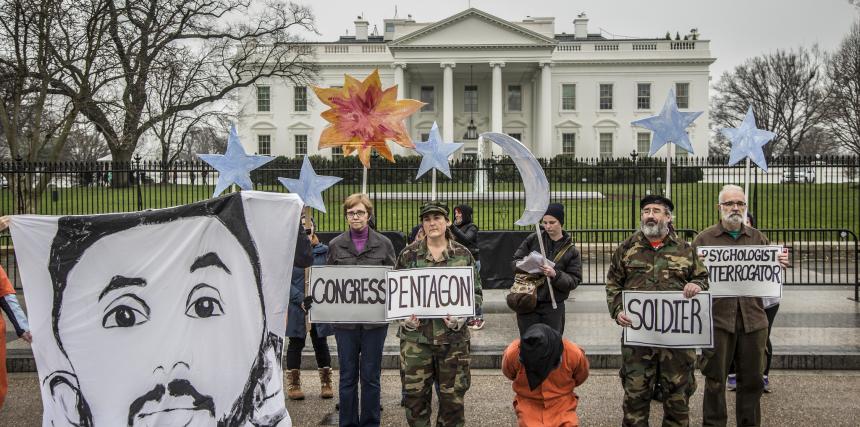“Nothing is impossible in life, as long as you live and breathe,” Mohammed Al-Hamiri once said, as he sat across the table from me and his CCR lawyer Omar Farah, in Guantanamo’s Camp Echo. I wanted desperately to believe him. It was March 2015; Mohammed had already spent thirteen years detained without charge at Guantanamo. “I’ve never lost hope that one day I will be free. I persevere.”
After years of waiting, that day finally came. Yesterday, Mohammed arrived in Saudi Arabia along with CCR client Tariq Ba Odah, and seven other men. He is home.
Mohammed’s story is like so many others. He should have never been at Guantanamo in the first place, let alone imprisoned for more than a decade.
As an adolescent, Mohammed suffered a serious accident. He fractured his skull and it had to be reconstructed with metal plates. After receiving medical care at the Saudi-German hospital in Jeddah, he was told he would need follow-up treatment. The cost was prohibitive, however, and so Mohammed travelled to Pakistan in search of more affordable medical care. He never made it home.
Mohammed was arrested by Pakistani police after the U.S. invasion of Afghanistan, and brought to the prison in 2002 when he was just in early 20s. In 2009, the U.S. government told him that he was cleared for release—that his detention at Gitmo was no longer necessary. Yet, there he remained, senselessly and cruelly.
“I was cleared to be released six years ago, “ he wrote in a letter to CCR. “But I am still under the rubbles breathing, after this earthquake that shook the world.” Mohammed’s continued detention had nothing to do with what he had done, and everything to do with political gamesmanship and the fact that he was a Yemeni citizen.
Despite setbacks and struggles, Mohammed never stopped dreaming. Writing was a way for him to cope with his circumstances. Thousands of miles away, at the island prison, he had no way of knowing how far—and who—his message might reach. This past January, Witness Against Torture brought Mohammed’s story to life in their Washington DC actions leading up to the 14th anniversary of Guantanamo’s opening. Activists held a giant banner with his portrait on the streets, in Union Station, and outside the White House, as they shared his beautiful and haunting words:
Freedom is hurt and I cannot do anything to save it. I’m still bandaging its wounds while tears are dripping on its cheeks, as it smiles at me and says 'I will hold you in my arms again someday. Don’t forget, I am freedom.'
A year after writing those words, Mohammed is free. Finally, he has felt the embrace of his loving mother once again.
But it is a bittersweet moment, for Mohammed, and the rest of us. Earlier this month, I was able to join the rest of Mohammed’s legal team, CCR lawyer Omar Farah and Legal Worker Ibraham Qatabi, on a call to share the news of his imminent release. As he tried to contain the range of feelings that came over him, he paused. “When people are released we think about those who remain. It’ll be hard not to think of the other brothers,” he said. “God willing, this place will close with the help of your hands.”
Today, 80 men remain at Guantanamo, the overwhelming majority of whom—like Mohammed—have never been charged with a crime. We must not lose hope that one day in the not too distant future, they too will have a homecoming.


